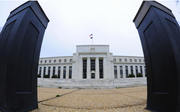 Niall Ferguson has a typically sharply-argued piece in the New York Times Magazine disputing the idea that the current financial crisis was caused by deregulation. Here’s the nub of his argument:
Niall Ferguson has a typically sharply-argued piece in the New York Times Magazine disputing the idea that the current financial crisis was caused by deregulation. Here’s the nub of his argument:
“The reality is that crises are more often caused by bad regulation than by deregulation. For one thing, both the international rules governing bank-capital adequacy so elaborately codified in the Basel I and Basel II accords and the national rules administered by the Securities and Exchange Commission failed miserably. It was the Basel system of weighting assets by their supposed riskiness that essentially allowed the Enronization of banks’ balance sheets, so that (for example) the ratio of Citigroup’s tangible on- and off-balance-sheet assets to its common equity reached a staggering 56 to 1 last year. The good health of Canada’s banks is due to better regulation. Simply by capping leverage at 20 to 1, the Office of the Superintendent of Financial Institutions spared Canada the need for bank bailouts.
The biggest blunder of all had nothing to do with deregulation. For some reason, the Federal Reserve convinced itself that it could focus exclusively on the prices of consumer goods instead of taking asset prices into account when setting monetary policy. In July 2004, the federal funds rate was just 1.25 percent, at a time when urban property prices were rising at an annual rate of 17 percent. Negative real interest rates at this time were arguably the single most important cause of the property bubble.” It sounds so obvious as to be hardly worth saying, but the key point about regulation is whether it is effective. More regulation is hardly a good in itself. Also, the exclusion of asset prices from inflation both here and in the States made us confuse the deflationary shock provided by the entry of China into the world economy with having solved the problem of how to produce growth without inflation.
One final point worth noting from Ferguson is this one about German banks:
“last year average bank leverage was four times higher in Germany than in the United States. Schadenfreude will be in order when the German banking crisis strikes.”







Comments